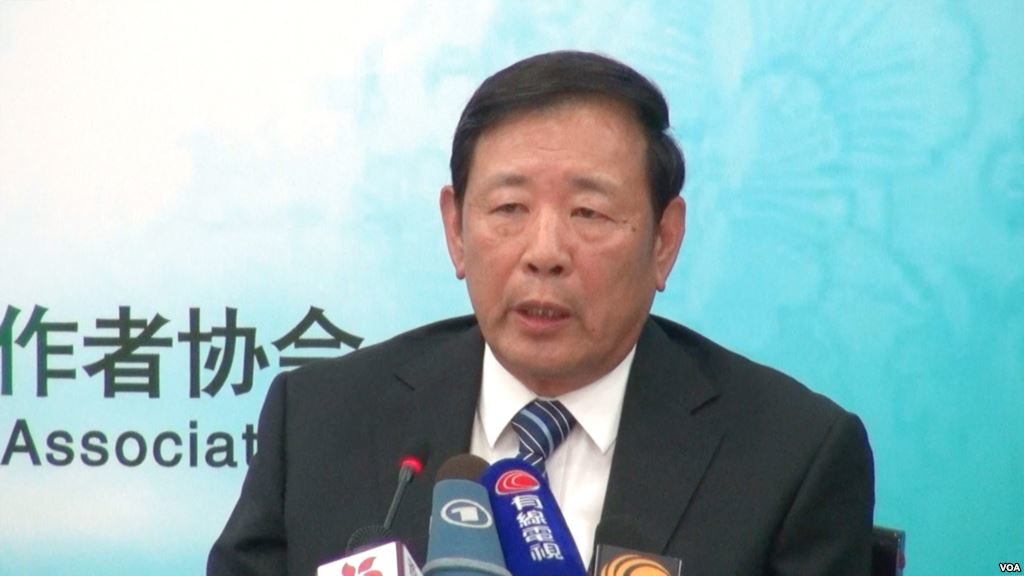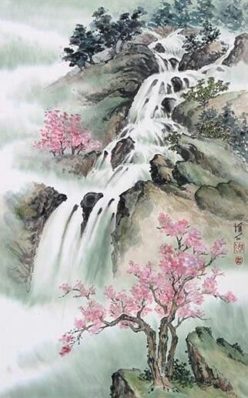
Luo Yuan (罗援, b. 1950), a retired PLA rear admiral, is known for his hardline anti-American views. The speech at an awards ceremony for defense scientists and engineers, translated/paraphrased here, is a reaction to the so-called trade war initiated by US President Donald Trump in the spring of 2018, imposing higher tariffs on various Chinese imports. The action was the product of long-standing American complaints against Chinese practices: overt and covert state subsidies to state-owned enterprises or nominally private enterprises actually controlled by the state; restrictions on foreign firms operating in China; forced technology transfers; casual theft of intellectual property . . . The heat of the conflict was no doubt enhanced by China’s growing economic power, its spreading global influence, and ever-improving military capacity—and perhaps reinforced by certain personality traits of the American president.
Luo purports to take the “war” metaphor literally: he sees China and America as enemies, not rivals. His hard line does not necessarily reflect the opinions of those actually making the decisions, and inside China itself Luo is regarded as something of a blowhard. Given the controls over expression in China, though, the authorities clearly have no problem with the speech being circulated, and probably find it useful to have it put out there—if only to give the Americans something to think about.

The most notorious part of the speech, at least as it was received in the United States, was the recommendation that China develop the capacity to sink US aircraft carriers. Looked at coldly, there are at least two complementary ways to react to this. First, it is hard to understand why Americans should profess to be so shocked, shocked by the idea. Secondly, Luo’s notion of the consequence of such an act seem wildly optimistic (even fatuous) if conceived as serving China’s interests.
First, it is simple common sense that China should seek an anti-carrier capacity. Should there be (God forbid) a shooting war between China and the United States, it would initially be fought (one assumes) in the East and South China seas, areas dominated since World War II by the American navy. The navy, possibly with the air force, would figure in the first confrontations, with attacks on Chinese targets on land and sea launched from aircraft carriers. As early as 2010 China reportedly began to deploy a land-based missile capable of sinking a carrier, missiles having the advantage over ships, submarines, or airplanes in by- passing the heavy defensive screen around a carrier. It is not clear whether China has developed a guidance system capable of following and hitting a moving target, once the missile reaches apogee and is in free-fall.
Apart from any specific crisis that would lead to actual fighting, China cannot be reasonably expected to accept American domination of its coastline and approaches to its coast if it had the capacity to avert this, and it is understandable that China would strive to become the dominant regional power. Moves toward this will require that China will encroach on claims made by other regional states. One advantage, perhaps, of the former American hegemony was that it tended to keep regional quarrels down. Now the regional powers must either shift for themselves, accept Chinese supremacy, or try to make deals with each other or with America to resist Chinese pressure. And at the same time America will, and should, continue to insist on free and unimpeded access to international waters, whether for commercial craft or for warships. So regardless of trade wars or anything else, there will be increased regional tensions. As Luo notes, America is incorporating an Indian Ocean component into its western Pacific strategy (in cooperation with India).
While the Admiral is on firm ground in advocating China develop the capacity to counter aircraft carriers, he is probably dangerously wrong about the advisability of actually exercising that capacity, particularly in the earlier stages of any hypothetical conflict. He reasons that Americans fear death, a quirk apparently not shared by other nationalities; and the loss of a carrier would mean 5000 American deaths. This, he believes, would put the entire country into a funk—boy, will the Americans be sorry they pissed us off. Americans, though, whatever signs of degeneracy they display, seem to have the ability to rise to the occasion (compare United Flight 93), and the cultural proclivity in the face of catastrophe seems to be massive and even blind bloody retaliation.
Luo’s overview of evolving American military doctrine is interesting, although it may ascribe more coherence to the doctrine than is warranted. What he describes seems to reflect various contradictions in the Trump camp. Some of it is traceable to the President’s own nationalist, isolationist impulses—America first; let the foreigners sort out their own problems; deal with other countries from the perspective of American interests, taking for granted that the others will also be looking out for themselves. Other points seem to show the opinions of the more bellicose elements of the neoconservative tendency, eager to project American power anywhere and everywhere—less to foster democracy and human rights (the rationalization for the more establishmentarian neocons) than to intimidate potential rivals. Luo is no doubt correct to claim that China has become America’s principle rival, somewhat, one might suspect, against the President’s instincts. Despite Luo’s attempt to identify China with some sort of idealistic globalism—a cover for an emerging Chinese imperialism, analogous to the globalization that rationalized American imperialism, China’s traditional posture has been much the same as what Trump would expect—a my-country-firstism, with a disinclination to meddle in the internal affairs of others. There are grounds here for making a deal. Hostility to China serves Trump by 1) indicating that Russia, with whom he was absurdly accused of “colluding,” isn’t the most dangerous rival; and 2) showing he is indeed tough. At the same time, and here Luo is probably on the mark, Trump’s establishmentarian foes and neocon allies fear China because China threatens America’s global supremacy.
The antagonism between China and America is, of course, mutually reinforcing. The United States, I would argue, has done nothing specific to antagonize China, but its power and presence in east Asia and its control of critical sea lanes constitutes an intrinsic threat to China. And, perhaps, there is some truth to Luo’s assertion that America will crack down sharply on any country that appears itself to be growing rich and strong and is not totally in the American orbit. The Chinese side is itself not without fault: its predatory economic policies, the target of America’s trade war; its tendency to make extravagant territorial claims (the claim that the entire South China Sea is legitimately subject to Chinese control); its attempts to bully its neighbors. The situation is reminiscent of US relations with Japan in the 1980s and 1990s, except that China is not an ally and the economic challenge is accompanied by increasing military strength and expanding political influence. Luo might respond that all of this could with at least equal truth be asserted against the United States. Be that as it may: that’s what makes for conflict.
Luo’s general themes accord with an enduring motif in contemporary Chinese political- military thinking. His comments are in tune with the “theory” set out in the famous 1999 work by two PLA senior colonels (brigadier, or one-star, generals in the American army system) on Unrestricted Warfare. The term unrestricted here does not quite mean what one spontaneously would take it to mean: it does not necessarily imply what has been called “total war,” with the implications of unconstrained violence and massive destruction of life and property. The implication, rather, is that there is no longer a clear or valid distinction between war and peace.
Every action between states (or states and non-state actors, such as al Qaeda) needs to be considered as a maneuver in an endless war. Thus, Luo treats the trade war as exactly that, a phase of the ongoing war between China and the United States (and, by extension, between each separately and the rest of the world).
So: Luo would counter Trump’s tariffs with economic moves designed to damage the American economy and cause pain to the American people, targeting especially Trump’s base of support. Rural folk in Iowa were big Trump supporters, so Luo would have China refuse to buy American soybeans (and next time Iowans won’t be so quick to re-elect Trump, and that will show him). Luo believes American car companies will go out of business if they are denied the China market. Maybe. But my impression is that American car companies already have a hard time competing abroad; and Chinese tend to prefer Japanese to American makes, or, in the luxury market, German. As Trump pointed out, China already imposes substantial tariffs on American automobiles (although, typically, maybe not as substantial as Trump asserted). And, of course, Trump certainly realized from the beginning that the move would mean some suffering for American automobile manufacturers, inasmuch as they import parts from China. As it happens, a few weeks before Trump’s address China was moving to cut these tariffs (a round for the Americans?). Luo might be on firmer ground were he to target American high-tech firms, a field where the Chinese might be genuinely competitive, and where the Americans still make use of Chinese labor.
Another aspect of the strategy is asymmetry. Lo does not advocate China matching the Americans aircraft carrier for aircraft carrier. Rather, China should concentrate on finding ways of sinking American carriers. China cannot hope in the sort or even medium run to approximate American wealth and strength. The emphasis in both strategy (as far as one can infer it) and weapons acquisition has been to find ways to get around American military superiority, to pick at the weaknesses inherent in reliance on technology and force.
This has been a theme in Chinese military thinking at least since the times of Sunzi: intelligence, indirection, deceit are preferable to direct battlefield confrontations, and provide ways for the weaker side to overcome the stronger. This was the theme of the old Maoist vision of “people’s war”: never fight a battle you can’t win; wear down the enemy; induce the enemy to disperse his forces and overextend his lines of supply; move to a direct toe-to-toe fight only after the enemy has become demoralized and worn out.
The Maoist approach assumed that the “people’s” side was relatively primitive. In the Chinese civil war the PLA (as the communist army came to be termed at that time) had no airplanes or navy, and most of their tanks and heavy artillery were captured from their foes. It also is highly probable that the strategy itself got more credit than it deserved: by the time of the civil war the government forces had already been demoralized by an eight-year war with Japan and by pervasive political corruption and out-of-control inflation. The 1990-1991 Gulf War also persuaded Chinese soldiers (assuming they needed persuading) that they should not take too cavalier an attitude toward high-tech weapons. But the Chinese construction of military high- tech has followed the principle of finding ways of working around American high-tech, not imitating what the United States has. Thus, while building up the airforce, rocket forces, and navy, China has also focused on advancing artificial intelligence and arcane fields like quantum computing. And this accounts for the venue of Luo’s speech.
